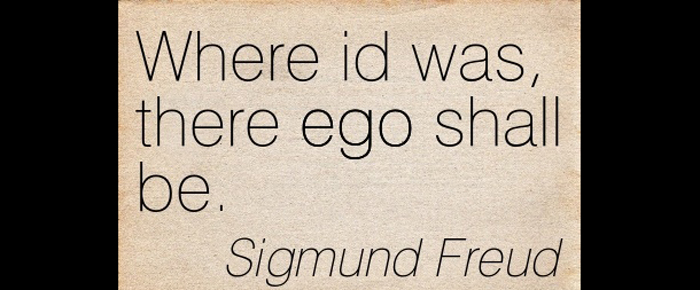
By Bronwyn Ison
Ego by definition has several interpretations. According to Webster, it is the opinion you have about yourself. One’s ego generally speaks to the part of the mind that has a sense of individuality and self esteem. Sigmund Freud developed the three elements of the personality – known as the id, the ego and the superego – working together to create complex human behaviors.
If you are egocentric you are centered in the ego or self-centered. Therefore, if one is self-centered, is this a positive or negative trait? As with anything in life everything is a matter of degree. Confidence and ego are worlds apart from one another. Displaying and having confidence is generally accepted, while a big ego carries a negative connotation. Self-preservation requires a concern and caring for one self, yet this needs to be tempered with a concern for others. We all know people who possess a heightened degree of relative self-importance. This personality flaw is not generally observed as a social attribute. Confidence is a feeling or belief that you can do something well or succeed at something. Believing whether or not you can achieve something has a lot to do with what you think of your self. Can you succeed? If you do, fantastic… if you do not your ego becomes bruised.
The “id” is driven by the pleasure principle. It is also the only component of the personality present at birth. The id seeks immediate gratification of all needs, wants, desires, and urges. In other words, it strives to meet our basic primitive urges to include hunger, thirst, anger, and sex. When these needs are unfulfilled tension and anxiety are experienced. As we know it is not realistic to get what we want when we want it. The tension that is created by this pleasure principle can be resolved by what is called the primary process. Example, you are hungry, you may form a mental image of your favorite food. Your mental image is the primary process, also known as wish fulfillment. Until this wish is fulfilled you will remain unsatisfied.
The unchecked ego can and usually will reap a negative reaction and consequence to self and the one inflicted. Famous people are well known for struggling with egoism. Recently I heard a quote, “Fame is the wrong idea of who you are.” Certainly I am not discounting that one should display a positive opinion about one’s self. Keeping yourself in check and being humble will keep you from becoming overly proud of yourself.
Sigmund Freud’s daughter, Anna Freud, indicated the principal human defense mechanism, “repression,” is a process that develops as a young child. Repression involves placing uncomfortable thoughts in relatively inaccessible areas of the subconscious mind. Clearly this can be dangerous. An unchecked ego can be counterproductive, unfulfilling and harmful.
Maintaining a healthy look inwardly produces a profound sense of self-worth and comfort. So, check your ego at the door knowing the benefits will produce a healthy mind and body.
Want to read and learn more? Be sure to read next weeks, “Check your Ego at the Door” Part Two in next week’s CV Weekly!
Bronwyn Ison is the owner of Evolve Yoga. www.e-volveyoga.com or (760)564-YOGA











































